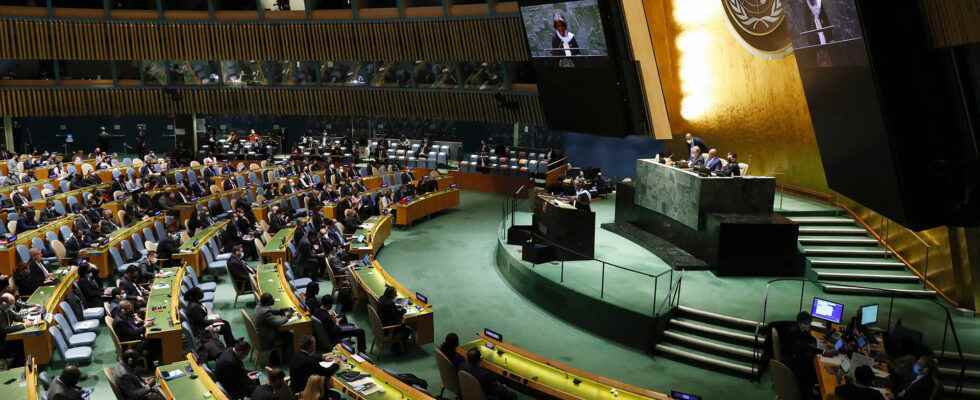According to sources close to the negotiations, Russia was particularly opposed to the paragraphs concerning the Ukrainian nuclear power plant in Zaporizhya, occupied by the Russian military.
Russia on Friday blocked the adoption of a joint declaration at the end of the four-week UN review conference of the treaty on the non-proliferation of nuclear weapons (NPT), denouncing “political” terms .
The 191 signatories to the NPT, which aims to prevent the spread of nuclear weapons, promote complete disarmament and promote cooperation in the peaceful use of nuclear energy, have been meeting at the United Nations headquarters in New York since August 1. .
But despite a month of negotiations and a final session postponed for several hours on Friday, “the conference is not in a position to reach an agreement”, said its president, the Argentinian Gustavo Zlauvinen, after the intervention of the Russia.
While decisions are taken by consensus, the Russian representative, Igor Vishnevetsky, has indeed denounced the lack of “balance” in the draft final text of more than 30 pages.
“Our delegation has a key objection to certain paragraphs which are shamelessly political,” he said, repeating several times that Russia was not the only country to have objections to the text generally.
According to sources close to the negotiations, Russia was particularly opposed to the paragraphs concerning the Ukrainian nuclear power plant in Zaporizhya, occupied by the Russian military.
The latest text on the table, seen by AFP, underlined “great concern” about military activities around Ukrainian power plants, including Zaporizhia, Ukraine’s “loss of control” of these sites and “the significant impact on security”.
Other sensitive elements for certain States were also under discussion during these four weeks, in particular the Iranian nuclear program and the North Korean nuclear tests.
At the last review conference in 2015, the parties were also unable to reach agreement on substantive issues.
In any case, “what is really problematic is that with or without text, it does nothing to reduce the level of nuclear threat at the moment,” Beatrice Fihn, who heads the International Campaign for abolish nuclear weapons (ICAN).
The draft text was “very weak, and detached from reality”, she added, noting the absence of “concrete disarmament commitments”.
On Saturday, Austria, a neutral and non-nuclear country, denounced the attitude of the great powers.
“While more than three-quarters of the 191 signatory states advocated credible advances in nuclear disarmament, it was mainly the nuclear-weapon states, and above all Russia, that resisted,” the government wrote in a statement. .
“Contrary to the disarmament commitments enshrined in the NPT, the five nuclear-armed states – the United States, France, China, the United Kingdom and Russia – are increasing or perfecting their arsenals”, he added.
“During negotiations in New York, there was no discernible will to implement previously unfulfilled contractual obligations,” he said.
At the opening of the conference, UN Secretary General Antonio Guterres said that such a “nuclear danger (had) not been known since the height of the Cold War”.
“Today, humanity is at a misunderstanding, a miscalculation of nuclear annihilation,” he warned.
